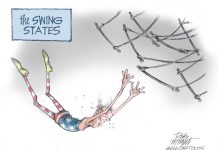By Aaron Miller
There is probably no more satisfying statement in the English language than giving the correct final solution to a game of Clue. When you definitively declare, “It was Col. Mustard in the billiard room with the revolver,” for a second you feel like Hercule Poirot or Sherlock Holmes.
It is just as rewarding to hear the defeated admiral of an enemy fleet declare, “You sunk my battleship!”
As we perused the shelves of a local department store, we wondered if the old-fashioned board games that we played during our youth are still around. To my surprise, the old-style games are enjoying something of a renaissance. There also are some new popular titles, too. Board games are making a resurgence with the hipster crowd who play in coffee shops.
For those of you who regularly read my column, it is going to come as no surprise that I am advocating for classic relics from days gone by. Backgammon, Pachisi and chess have all been around for hundreds of years. Parker Brothers first published Monopoly in 1935 and Clue in 1949.
As with manual transmissions, old-time radio or Chuck Taylor All Stars, these games have reached a level of greatness that cannot be improved with new technology. Their simplicity and imperfections are a part of their charm. I don’t like them all, though. I can’t stand Pictionary because I can’t even draw a box.
It might be a good idea to have one of these games on hand in case we ever have a big winter storm again. You can put it in with your prepper supplies along with water, rice and candles. In a post-apocalyptic world, endless rounds of Chutes and Ladders would be a great way to pass the time.
Classic games are, of course, very educational. They teach us math, teamwork and creativity. We also learn patience from board games, especially from those marathon games that last hours. Patience is a lesson that many of us, including yours truly, needs a refresher course on from time to time.
I learned lessons in strategy from Risk, Stratego, and chess. I learned about classic literature from the Authors card game. Scrabble taught me new words and spelling skills. The old games also forced you to make friends, or at least pretend that you like someone long enough so that you have the minimum number of players for Monopoly.
Of course, these games are fun, too. Some of my fondest memories from my youth come from playing classic games with my family.
It also is quite entertaining to watch an opponent get so irate that they are losing a game they throw their cards in the air or turn a board game over in a fit of rage. It is funny how upset someone can get when the stakes are so low. Good times!
Before the digital age, it used to be a prerequisite to learn Euchre before graduating from an Indiana school. If the basketball team was not playing or you were younger than 21, there was not much else to do weekend evenings on a college campus during the winter.
Games also teach you important social skills such as deception, lying and the inevitable conflict resolution. These are skills we all need to navigate life in the grown- up world.
As you are last-minute shopping for the holidays (and that is the only kind of shopping that I do), you might consider an old-fashioned board or card game.
Aaron Miller is one of The Republic’s community columnists and all opinions expressed are those of the writer. He has a doctorate in history and is an associate professor of history at Ivy Tech Community College — Columbus. Send comments to [email protected].




